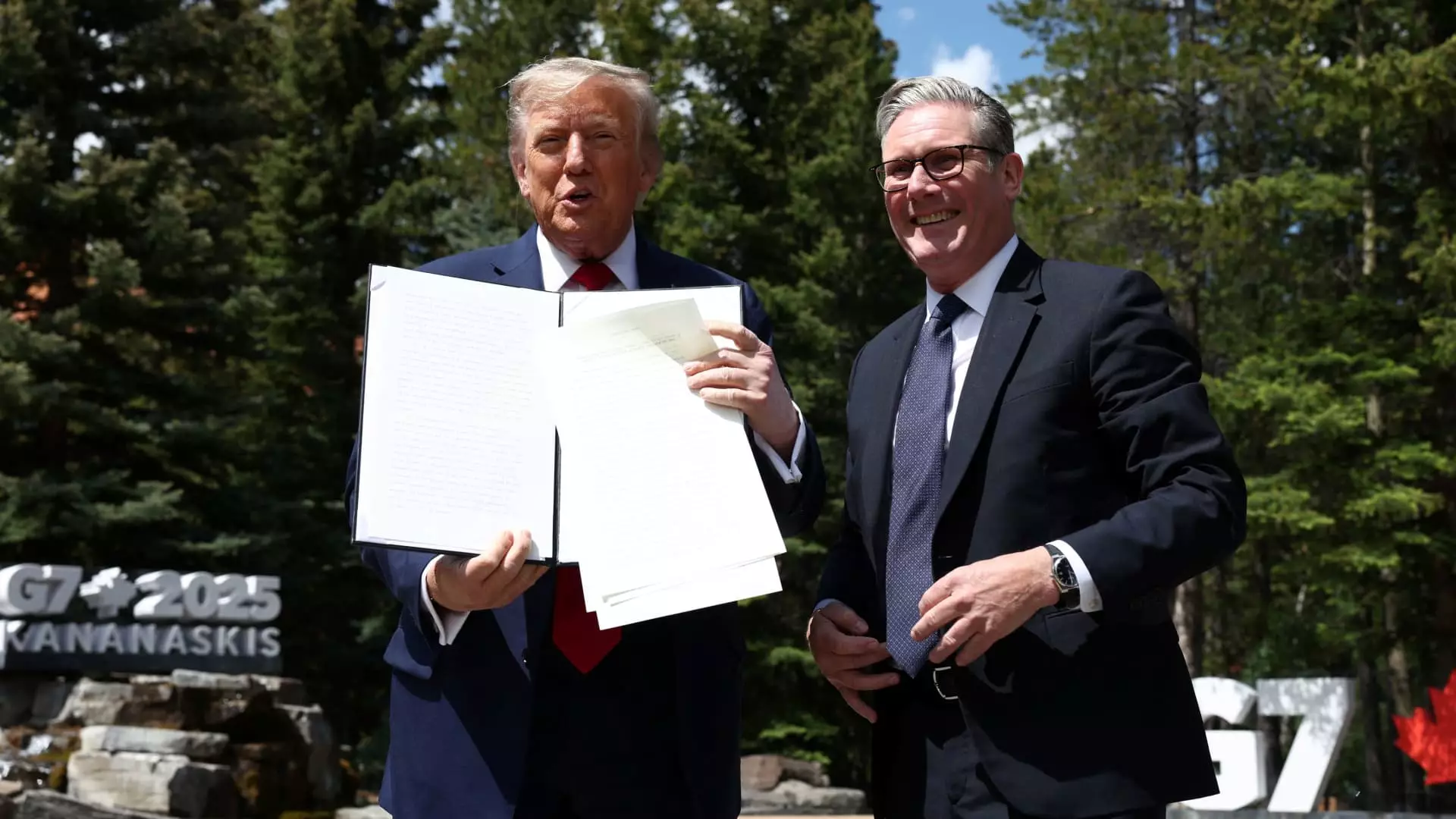In the whirlwind of recent trade negotiations, the narrative of progress and stability has been forcefully promoted. The White House has managed to sign several agreements amidst the chaos of tariff battles, yet beneath this surface lies an unsettling truth: the core of these deals is fragile and increasingly untrustworthy. The assumption that high tariffs will steadily push trading partners into compliant agreements disregards the inherent risks of an unpredictable geopolitical landscape. As a center-right observer, I see a dangerous optimism lingering in market circles—one that naively assumes diplomatic virtue and economic stability can coexist with the unilateral tactics employed by the Trump administration.
The administration’s posture—signing new deals while maintaining aggressive tariffs—appears more like a high-stakes gamble than a strategic pivot toward enduring trade stability. Many of these agreements remain opaque, with key details still unresolved. This lack of transparency is a ticking time bomb, threatening to undermine the very foundations of international economic cooperation. For investors and policymakers, the current narrative of a “done deal” rings hollow, hiding the potential for these agreements to unravel as geopolitical tensions intensify and legal challenges mount.
Legal Quagmires Threatening the Sovereignty of US Trade Policy
One of the most precarious elements in this diplomatic chess game is the legal basis for Trump’s tariff authority. While the White House claims broad powers under the International Emergency Economic Powers Act (IEEPA) of 1977, judicial skepticism is growing. Courts, including high-level appeals, have expressed doubts about whether the president possesses such sweeping authority—especially when claimed under the guise of national emergencies. If courts eventually block or limit these tariffs, the entire military of trade negotiations could collapse overnight, rendering previous deals null and void.
This looming legal uncertainty embodies a fundamental flaw in the current strategy: reliance on executive overreach rather than robust, legislatively backed trade agreements. The possibility that courts will restrict presidential power—and Trump’s history of pushing legal boundaries—suggests that the entire framework is on shaky ground. If the judiciary acts as critics anticipate, the president’s claims to unilaterally impose tariffs could be undone, plunging the U.S. and its partners into renewed chaos. Such a scenario would prove disastrous for markets and the broader economy, exposing the superficial stability that critics have long warned about.
Negotiations: The Illusion of Finality in a Shifting Landscape
Beyond legal concerns, the negotiations themselves are riddled with inconsistencies and unfulfilled promises. While the administration touts agreements with Indonesia and the Philippines, the details remain shrouded in secrecy, and conflicting reports from other nations cast doubt on their authenticity. Japan, South Korea, and several European countries have voiced disapproval or expressed skepticism about the actual terms being negotiated behind closed doors.
This phenomenon reveals an almost orchestrated illusion of progress. The apparent momentum masks an underlying reality: many of these deals are hollow, vulnerable to collapse once exposed to the court of international opinion or domestic political pressure. The European Union’s reaction to the supposed “deal” involving a 15% tariff on goods further exemplifies this fragility—labeled as “unbalanced” by critics and likely unenforceable in the long term. It becomes clear that the Trump administration’s tendency to announce deals prematurely is sowing the seeds of future conflict, not resolution.
Global Alliances: The Lasting Impact of a Fractured U.S. Diplomacy
Trade agreements hinge on mutual trust and long-term commitments. Yet, the current approach champions short-term wins while neglecting enduring partnerships. Countries like Canada, Mexico, and China remain in limbo, their negotiations delayed or uncertain. Trump’s decision to postpone tariffs on Chinese imports exemplifies this ambiguity—yet it also highlights the lack of a clear, sustainable strategy.
Furthermore, allies such as Japan and South Korea have expressed differing interpretations of the agreements Trump claims to have reached. These discrepancies are more than technical—they threaten to unravel the very alliances the U.S. seeks to bolster. An unpredictable America under a president known for abrupt policy shifts risks pushing foreign partners toward more insular and defensive strategies, weakening the fabric of global cooperation that has served long-term economic stability.
The Illusion of Market Resilience and the Hidden Costs
Despite headlines celebrating stock market highs and a resilient economy, beneath the surface lies a growing disconnect. The markets have behaved as if tariffs are a corporate nuisance rather than a long-term threat. Yet, the reality is more insidious: tariffs, even if temporarily absorbed, exact a hidden toll—raising costs, disrupting supply chains, and undermining competitiveness.
Most experts underestimate or outright dismiss the long-term damage these trade tensions could inflict. JPMorgan estimates a mere 1% GDP hit from tariffs—an optimistic reading that ignores the potential for escalation and retaliatory measures. Markets, in their current complacency, have priced out recession risks, but this confidence is dangerously misplaced. When tariffs become embedded in economic realities, they threaten to create a “price out” scenario where the costs of protectionism impoverish consumers and distort market signals.
The Trump Factor: The Wild Card in a Shaky Game
Perhaps the most unpredictable element of this entire scenario is President Trump himself. His penchant for sudden reversals, unpredictable policy shifts, and unorthodox negotiations makes legalized forecasts impossible. Just when markets settle into a false sense of security, the Trump factor can suddenly upend the status quo, whether through new threats, deal cancellations, or surprising diplomatic overtures.
This capriciousness underscores a fundamental flaw: reliance on hope rather than strategic planning. A rational trade policy requires stability, but under an administration where decisions hinge on personal whims and electoral calculations, permanent credibility remains elusive. For global economic health and domestic confidence, the only certainty is uncertainty—an unsettling prospect for anyone who values steady growth over volatile political theatrics.

